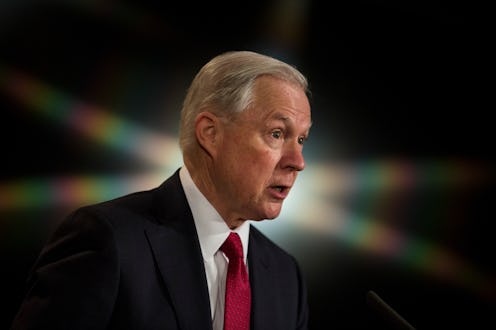
The Washington Post published a report on Tuesday night claiming that Jeff Sessions had met with Russia's ambassador to the United States during Donald Trump's 2016 presidential campaign. More specifically, Sessions supposedly spoke twice to Russian Ambassador Sergey Kislyak that year. As the Post mentions, the pair's September meeting occurred when Russia was allegedly hacking the U.S. presidential elections with the intention of helping to elect Trump. Russia has denied those hacking claims, refuting both the FBI's and CIA's matching conclusion. The content of Sessions' conversations with the Russian ambassador have not been disclosed, but they're sure to become the subject of intense scrutiny in the days to come.
The U.S. Justice Department officials did indeed confirm Sessions' meetings with Kislyak to the Post. And to make matters more complicated, the current U.S. attorney general failed to mention those meetings during his already contentious confirmation hearing when asked whether he knew anything about potential connections between Trump surrogates and Russia.
Both a Justice official and Sessions' spokesperson have defended him, claiming that he did not mislead the legislators who confirmed him as attorney general. In a statement responding to the report, Sessions' spokeswoman Sarah Isgur Flores clarified why he believes he answered fellow senators' questions truthfully.
He was asked during the hearing about communications between Russia and the Trump campaign — not about meetings he took as a senator and a member of the Armed Services Committee ... Last year, the Senator had over 25 conversations with foreign ambassadors as a senior member of the Armed Services Committee, including the British, Korean, Japanese, Polish, Indian, Chinese, Canadian, Australian, German and Russian ambassadors.
According to CNN, Sessions also responded that he "never met with any Russian officials to discuss issues of the campaign."
At the time, Sessions was certainly a member of the Senate Armed Services Committee. However, the Post claimed to have reached out to the committee's other 26 members to ask whether they had communication with the Russian Ambassador to the United States in 2016. Supposedly 20 members did respond to the request, answering that they had not spoken with the ambassador.
This likely comes as yet another headache to the Trump administration, which recently saw the resignation of former National Security Adviser Michael Flynn after it was revealed that he, too, had spoken with Kislyak but had later misled Vice-President Mike Pence as to the content of those conversations.
Democratic legislators had already speculated days prior to the Post's report on Sessions that he should step down from investigating any potential contacts between the Trump campaign and Russia. Now, those calls will surely grow stronger.